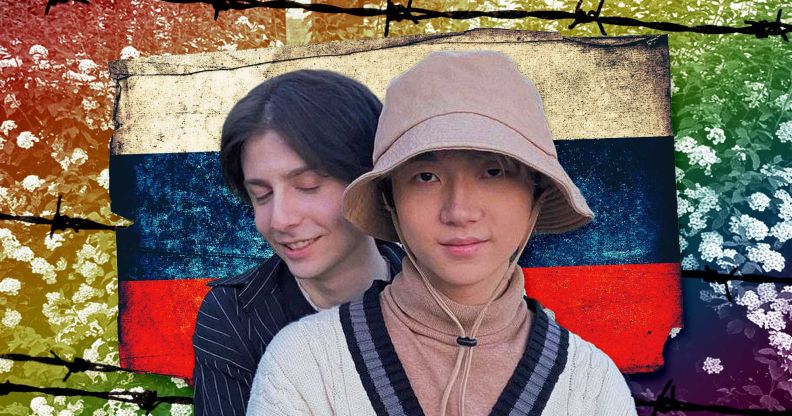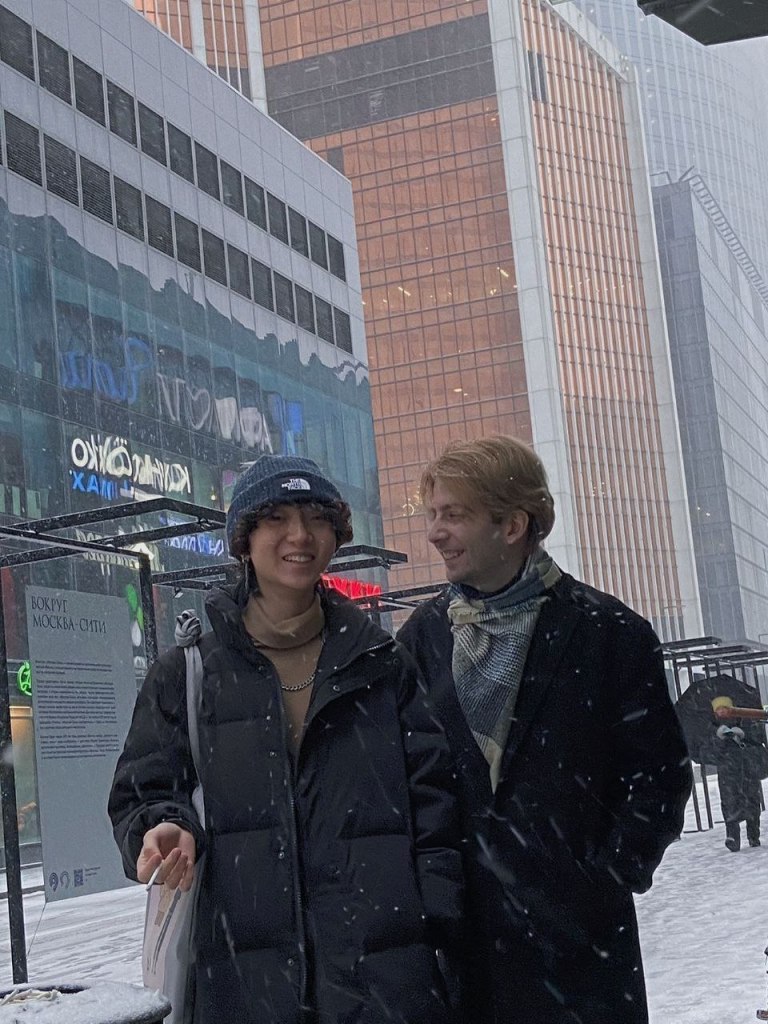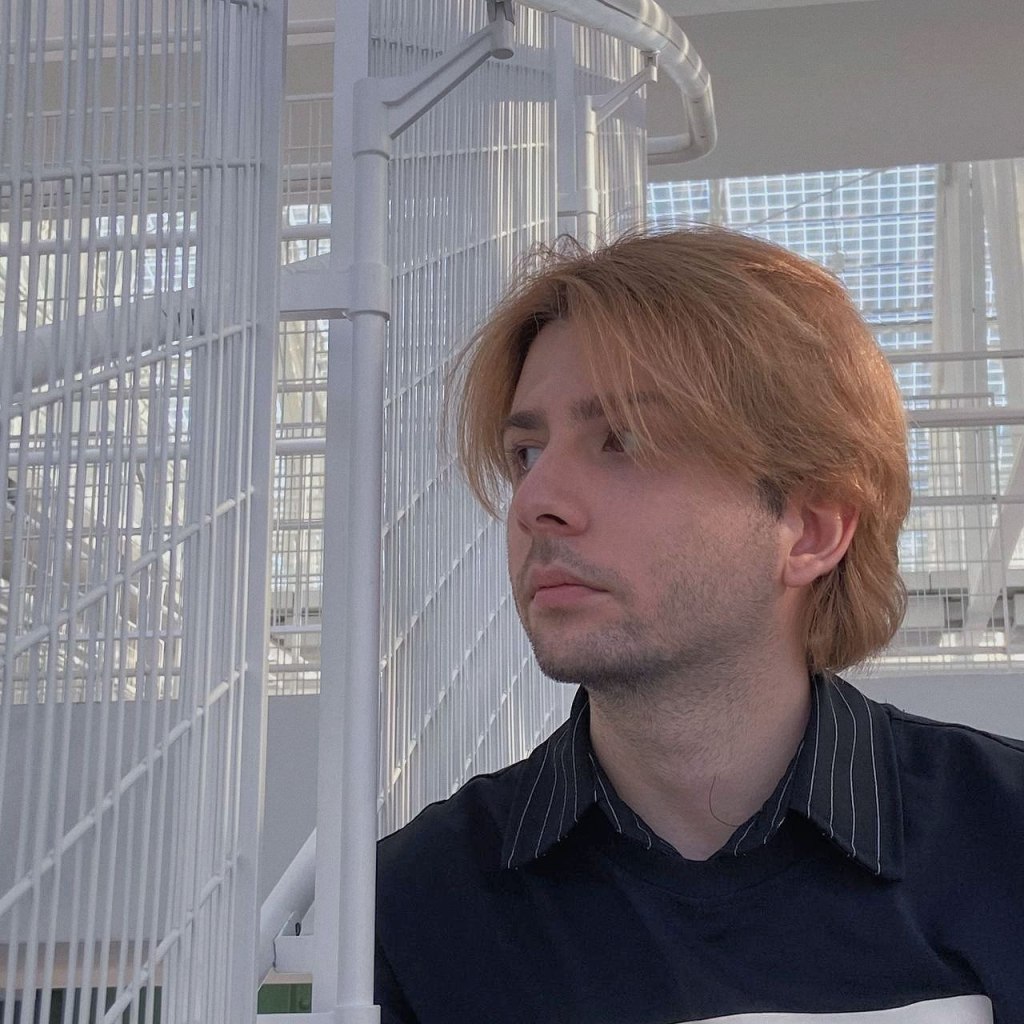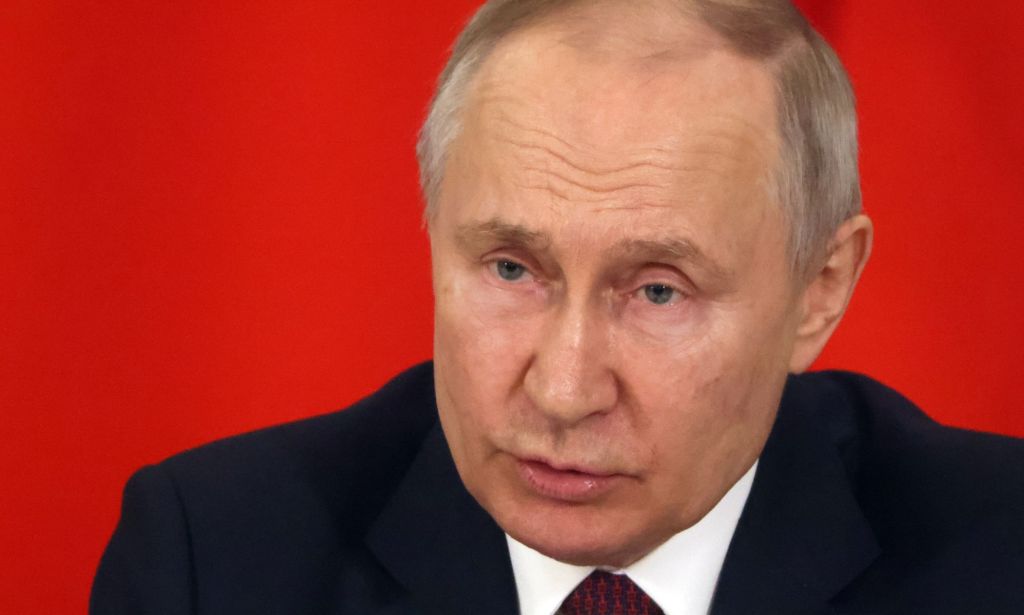YouTuber arrested for ‘LGBTQ+ propaganda’ in Russia warns Putin’s tactics are working

Gela Gogishvili says he and his partner, Haoyang Xu, were arrested and detained because they refused to be silent as Russia’s government attacks the LGBTQ+ community. (Getty/Gela Gogishvili and Haoyang Xu)
A queer YouTuber who was detained in Russia for alleged ‘LGBTQ+ propaganda’ with his boyfriend says his arrest was a “demonstrative spanking”.
Gela Gogishvili and his partner Haoyang Xu, from China, were arrested by Russian authorities on 5 April for allegedly violating the country’s so-called ‘LGBTQ+ propaganda’ law, which criminalises any act regarded as promoting or disseminating information about queer identities.
The couple live together in Russia and share details of their life together on social media.
While Gela was released soon after, Haoyang was held in detention and threatened with deportation for almost three weeks before being released on 25 April.
Gela tells PinkNews, via translation by Queer Svit’s Anna-Maria Tesfaye, that there’s an expression in Russian called “demonstrative spanking”.
It means to make an example of somebody – which is what Gela thinks has happened to him and Haoyang, “two of the most famous Russian queer bloggers who are still in Russia”, for not being quiet in the face of oppression and discrimination.
“What it means is that, if you are queer, you have to be silent, and the propaganda is working because this is what will have to you,” Gela says.
“You either have to be silent if you want to stay in Russia or, if you want to express all of this, you have to get out of Russia.”

To Gela, it feels like the tactic is working. He says the Kremlin can silence anyone who speaks out against the regime, the war on Ukraine or even individuals expressing their authentic self with swift, harsh punishment.
Gela has lived most of his life in Moscow with his family, who are an “orthodox Georgian homophobic family”. But Russia can strip the citizenship of people who speak out – and he fears this could happen to him.
Putin uses LGBTQ+ hate to further his agenda
The Russian government actively discriminates against and persecutes LGBTQ+ people, largely through its ‘LGBTQ+ propaganda’ law.
Passed in 2013, the first iteration of the law barred any queer-inclusive media – including advertisements, TV shows and books – from being seen by minors.
It was extended to all age ranges last December, and it’s had a chilling effect on the ability for LGBTQ+ people to navigate life in Russia and organisations that help the community from being able to exist.
Gela thinks this was a power grab by Putin.
“He decided: why not take LGBT and say that everything is bad because of them,” Gela says, via translation.
“On one hand, now he has more supporters as in homophobes and people who believe in god and think that homosexuality and transness are a sin.”
“On the other hand, they say – a lot of newspapers and the government – that ‘These two foreigners [Haoyang and Gela] came to Russia, making our people queer and gay. Because in Russia, we don’t have this. They brought it from the west’ or whatever.
“Even though Haoyang is from China, which is not the west, and [I’m] ethnically Georgian.”
When Putin announced Russia’s invasion of Ukraine in February 2022, he framed the move, in part, as a means of defending so-called “traditional values” from Western “attitudes that are directly leading to degradation and degeneration, because they are contrary to human nature”.
The president referenced the growing acceptance of the LGBTQ+ community – a subject he’s long weaponised as a means of undermining and attacking queer people. He’s used this as a way to portray himself as a defender of conservative, religious values and enshrine his leadership.
“One of my friends said that Putin is like a magician – he does these horrible things like war and crimes with one hand, and he tries to place it with the people who are already marginalised,” Tesfaye says.
Tesfaye describes the current situation in Russia for the LGBTQ+ community as “scary” and “heartbreaking”.
“We’re kind of coming back to the Soviet situation right now,” she says, referring to the fact that homosexuality was a crime punishable by prison and hard labour during the Soviet Union.
“It feels like this is the next thing that’s going to happen, and it’s very scary,” Tesfaye says. “They don’t even allow organisations to work correctly to help these people.”
She continues: “The people are not protected. Of course, there is a lot of discrimination in general, but now it’s supported officially by the government on all levels.”

Tesfaye says there are a lot of issues concerning homophobia and transphobia as well as racism and the mistreatment of Indigenous people within Russia, which has been fuelled by propaganda.
“There are lots of stereotypes about Russian Asians, Russian Caucasians and of course Black people, Asians and Latin Americans, everyone, that [they’re] aggressive, mean, stealing stuff… The same thing with queer people because people already don’t like it,” she says.
“It’s not just happened because the propaganda was working for a lot of years, and there’s a lot of hate for queer people and for immigrants, especially non-white immigrants.”
Despite it all, Gela believes LGBTQ+ people in Russia will continue to “fight for their rights”.
Russia’s LGBTQ+ laws
In Russia, homosexuality was legalised in 1993, after the fall of the Soviet Union.
Same-sex sexual activity between men was first banned under the reign of Peter the Great – who introduced a wide range of reforms to modernise and Westernise Russia – in the 18th century. This initially only applied to soldiers in military statues but was later extended to civilians.
When the October Revolution came in 1917, the Bolshevik regime decriminalised homosexuality. The Bolsheviks rewrote Russia’s laws and produced two criminal codes (in 1922 and 1926) – both left out articles criminalising queerness.
Under Joseph Stalin, the Soviet Union recriminalised consensual same-sex sexual activity in 1933. Though the gay sex ban was lifted 30 years ago, anti-LGBTQ+ attitudes persist, and homosexuality wasn’t officially declassified as a mental illness in Russia until 1999. This was the same year that Putin became the acting president of Russia.
There are no laws to protect LGBTQ+ people, like anti-discrimination or equal marriage measures, and the LGBTQ+ propaganda law is increasingly used to target the community. While a 2018 law allowed trans people to obtain gender recognition, there have been attempts to end this provision.

Tesfaye says it’s “easy” in some ways for Putin to blame the acceptance of LGBTQ+ people on ‘the West’, but it ignores the fact that “homophobia, queer phobia and transphobia came from the West just like racism and the concept of races”.
“Everyone just forgets that there are lots of stories about queer people and trans people hundreds of years ago, both in Russia and, well I’m half Ethiopian and there are records of queer people [there] also hundreds of years ago,” she says.
She continues: “It’s not something new.
“Actually, this is all lies that, ‘Well, that [being LGBTQ+] is propaganda from the West’ because if you could change your gender or sexuality by looking at someone, we would all be straight and cisgender.”
How did this story make you feel?

